The Ultimate Guide to Fighting a Traffic Ticket in the U.S. (Legally and Successfully)
Traffic tickets are a common experience for drivers worldwide, often arising from routine situations like exceeding the speed limit, minor infractions, or unexpected roadway errors. Despite the frequency of these occurrences, traffic tickets can have significant financial and legal implications for drivers, leading to fines, potential increases in insurance premiums, and even risks to one’s driving record if not properly addressed. For some drivers, this can also result in license suspensions or more serious legal consequences if left unchallenged.
Understanding the available legal options and the best strategies for contesting a traffic ticket can provide a powerful means to manage and, in some cases, negate the effects of a ticket. Contesting a ticket not only offers a way to avoid immediate penalties but also enables drivers to exercise their rights, prevent unjust charges, and, where possible, clear their driving record. For drivers unfamiliar with legal processes, however, challenging a ticket may seem daunting. Yet, with knowledge of proper procedures, understanding of the law, and strategic planning, contesting a traffic ticket can be manageable and, in many cases, successful.
Learn more: How To Check and Pay The Traffic Fine Online In The U.S 2024
KnowInsiders explores the legal and effective ways to contest traffic tickets, covering essential preparation, practical advice, and insights into defending oneself in court. By understanding these methods, drivers can approach the process with confidence, backed by knowledge and actionable steps toward a fair outcome.
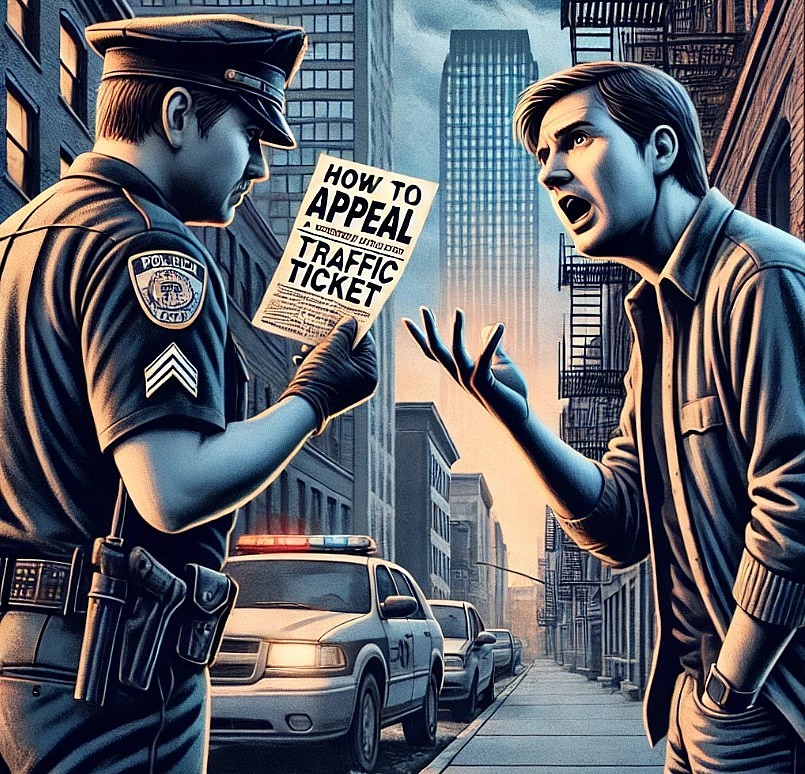 |
| Were you wrongly accused of a traffic violation? You can contest the ticket. Image: KnowInsiders |
Types of Traffic Tickets
Traffic tickets come in different forms, each with varying levels of severity and potential penalties. Understanding these distinctions is essential when deciding whether to contest a ticket and what defenses may apply. Here are the main types of traffic tickets drivers should be aware of:
Moving Violations
Moving violations occur when a driver disobeys traffic laws while the vehicle is in motion. Examples include speeding, running red lights, failing to yield, or reckless driving. Moving violations are typically seen as more serious than non-moving violations since they can directly affect road safety. Penalties often include fines, points on the driver’s record, and potential insurance increases. In more severe cases, such as reckless driving or driving under the influence, penalties may include jail time and a suspended license.
Non-Moving Violations
Non-moving violations involve infractions that occur when the vehicle is not in motion, such as parking violations, expired registration, or faulty equipment (e.g., broken taillights). While these violations usually carry less severe penalties than moving violations, they still involve fines and, in some cases, points on the driver’s record. Non-moving violations can often be resolved by correcting the issue, such as updating registration or repairing faulty equipment, which may reduce or dismiss the fine.
Criminal Traffic Violations
Criminal traffic violations involve severe offenses, such as driving under the influence (DUI), driving with a suspended license, or committing a hit-and-run. These violations are classified as misdemeanors or felonies and carry substantial penalties, including possible jail time, large fines, and permanent marks on the individual’s criminal record. Contesting criminal traffic violations typically requires legal representation due to the complexity and severity of the charges.
Each type of ticket may have unique procedures and defenses, so understanding the category and specifics of a traffic violation is crucial before proceeding with any legal action. By distinguishing the nature of the violation, drivers can better prepare a defense that aligns with the circumstances of their ticket.
Learn more: How to Pay Traffic Tickets/Fines in the U.S 2024/2025
Reasons to Contest a Traffic Ticket
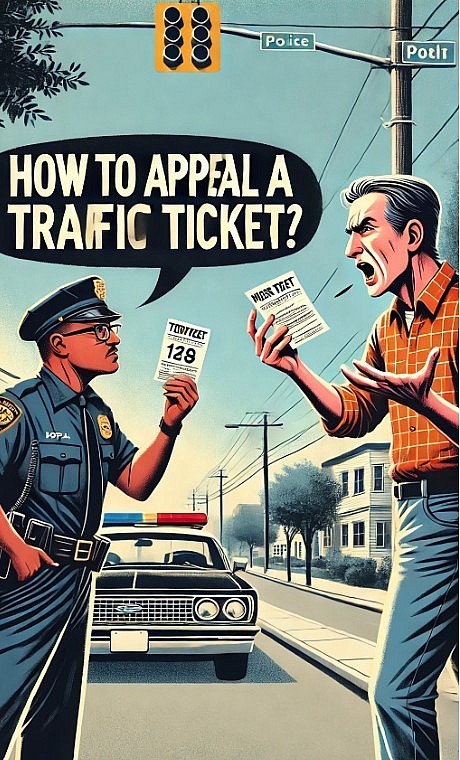 |
| Reasons to Contest a Traffic Ticket |
While paying a traffic ticket may seem like the simplest solution, there are compelling reasons to consider contesting it:
Financial Implications
Traffic tickets often carry hefty fines, and simply paying them may lead to financial strain. Furthermore, accepting a ticket can increase car insurance premiums, resulting in long-term financial consequences that exceed the original fine.
Impact on Driving Record
Traffic tickets typically lead to points being added to your driving record, which can accumulate over time and lead to consequences like license suspension. Contesting a ticket gives you a chance to prevent or reduce these points.
Preventing Unfair Charges
Traffic laws can be misinterpreted, and tickets may sometimes be issued unfairly. Contesting allows drivers to challenge questionable charges, especially when the evidence suggests a different interpretation of the events.
Contesting a ticket empowers drivers to exercise their rights, seek fair treatment, and avoid penalties that may not be entirely justified.
Research and Preparation Before Contesting
Effective preparation can greatly improve your chances of contesting a ticket successfully. Here are key steps to take:
Review Ticket Details
Start by carefully examining the ticket, noting the violation code, fine amount, court date, and any additional instructions. Each detail is essential for building your case.
Collect Evidence
Gathering relevant evidence, such as dashcam footage, witness statements, and photos, can help substantiate your defense. For instance, photos of a hidden or unclear traffic sign can support claims of accidental violation.
Understand Applicable Traffic Laws
Familiarize yourself with the specific traffic laws related to your ticket. Review similar cases in your jurisdiction to see if others have successfully contested the same type of ticket and what strategies they used.
Consider Legal Representation
If your violation is severe or complex, consulting an attorney may be beneficial. Even minor violations, however, can benefit from professional guidance on defense strategy.
Legal Grounds to Contest a Ticket
Building a solid defense often relies on establishing strong legal grounds. Here are some common arguments used to contest traffic tickets:
Lack of Evidence or Inaccurate Evidence
For a court to uphold a ticket, law enforcement must provide evidence, such as radar readings, dashcam footage, or eyewitness accounts. If this evidence is missing or inconsistent, the judge may dismiss the case.
Procedural Errors
Minor procedural mistakes made by the officer, such as incorrect documentation of location or time, can undermine the ticket’s validity. Courts often dismiss tickets with critical errors that impact the ticket’s accuracy.
Misinterpretation of Traffic Laws
Drivers can argue that the ticket resulted from a misinterpretation of the law. For example, in cases where traffic signs were obstructed, a judge may accept this as a valid reason for a minor infraction.
Successful Traffic Ticket Appeals and the Low Appeal Rate
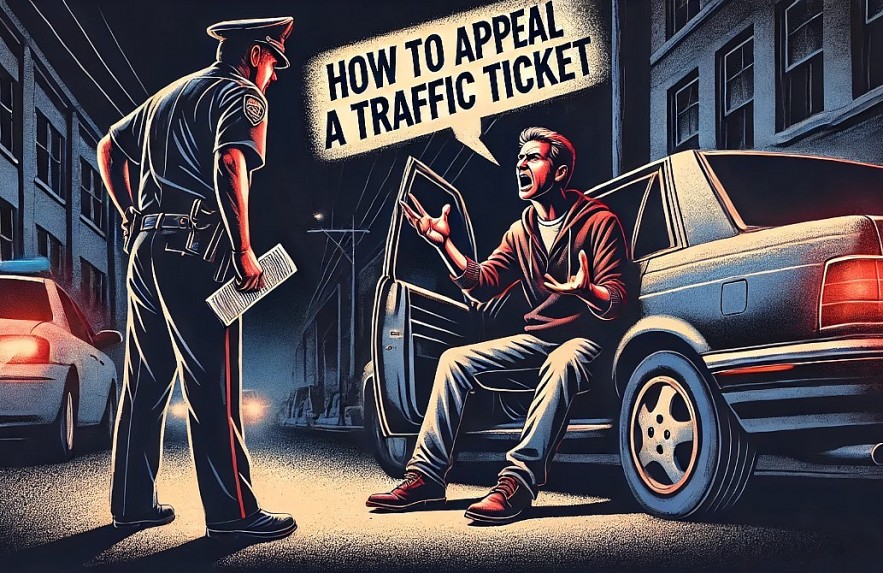 |
| Low Appeal Rate |
Although contesting a traffic ticket can result in favorable outcomes, only a small percentage of drivers choose to appeal their tickets. Here’s a look at why and how contesting works:
Examples of Successful Appeals
Common grounds for successful appeals include lack of evidence, procedural errors, and technical issues like faulty radar guns. Drivers who successfully appeal often have compelling evidence or catch minor errors in the ticketing process that cast doubt on the case.
Success Rates in Traffic Ticket Appeals
The success rate of appeals varies but typically ranges from 20% to 50%, depending on the case’s strength and the court’s practices. Many parking ticket disputes, for instance, have high success rates, especially when drivers present clear evidence of compliance.
Why Few Drivers Contest Traffic TicketsLack of Knowledge: Many drivers don’t realize they have the right to contest tickets or assume that contesting is only for severe cases. Complexity and Time Commitment: Contesting a ticket can feel overwhelming and time-consuming, deterring many drivers from taking action. Fear of Additional Penalties: Some drivers worry about facing higher fines if they lose their appeal, making them hesitant to risk contesting. |
Steps to Contest a Traffic Ticket
Here’s a step-by-step guide for contesting a ticket:
Request a Hearing
Follow instructions on the ticket to request a court date, usually within 30 days of the ticket issuance.
Prepare Your Defense
Gather evidence and review relevant traffic laws that support your case. Organize documents to present to the court.
Attend the Hearing
Present your defense calmly and clearly, and remember that you have the right to cross-examine the officer if needed.
Know Your Rights
Understand your rights, including the right to review evidence and call witnesses, if applicable.
Alternatives to Court Hearings
Not all tickets require a court appearance. Here are alternatives:
-
Online or Mail Contesting
Many jurisdictions allow online or mail-in appeals, especially for minor infractions.
-
Plea Bargains
Some drivers negotiate with prosecutors for reduced fines or points.
-
Traffic School
Attending traffic school may help you avoid points on your license.
Consequences of Late or Non-Payment of FinesFailing to address a traffic ticket can have serious repercussions: Additional Fines Failing to pay a ticket on time results in additional late fees. License Suspension Many states suspend licenses for unpaid tickets. Warrant Issuance Unpaid fines can lead to a bench warrant, resulting in potential arrest. Impact on Credit Score Some unpaid tickets are sent to collections, affecting credit scores. |
Common Mistakes to Avoid
Avoid these common errors:
Lack of Preparation
Failing to gather evidence weakens your case.
Missing Deadlines
Court dates and deadlines are critical; missing them can lead to default judgments.
Challenging an Officer’s Credibility Without Evidence
Challenging the ticketing officer’s integrity without proof can harm your defense.
Conclusion and Key Takeaways
Contesting a traffic ticket is a legal right that can save drivers from unnecessary fines, prevent insurance rate hikes, and protect their driving records. Although the process may seem complex, understanding the types of traffic violations, preparing evidence, and following structured legal steps can make contesting tickets both manageable and worthwhile. For drivers facing significant penalties or points, even minor successes in court—like reduced fines or dismissed charges—can lead to lasting financial and legal benefits.
While many drivers choose to simply pay their tickets, exercising the option to contest allows them to defend their rights and ensure fair treatment. Whether a driver is fighting a minor parking ticket or a more serious moving violation, knowledge, preparation, and strategic legal grounds are essential. With this guide, drivers are equipped to make informed decisions and approach the process confidently, knowing that a fair resolution is both achievable and within their rights.
Frequently Asked Questions (FAQs)
-
How long do I have to contest a traffic ticket?
Typically, drivers have 30 days from the ticket issuance date to request a court date or submit a plea. However, this varies by jurisdiction, so it’s essential to check the deadline noted on the ticket itself.
-
Can I contest a ticket without going to court?
Yes, some jurisdictions allow drivers to contest minor violations online or by mail. Check local regulations or contact the court to learn about non-court options for contesting your ticket.
-
What happens if I miss my court date?
Missing a scheduled court date may result in an automatic judgment against you, additional fines, or even a bench warrant for failure to appear. It’s crucial to attend or reschedule if you cannot make the original date.
-
How can I request evidence, like dashcam footage or police reports?
Many courts allow you to request discovery, a process to obtain evidence from the prosecution, including police reports and videos. Contact the court or an attorney to understand the correct procedure for evidence requests.
-
Will my insurance rates increase if I pay the ticket?
Yes, paying a ticket often indicates admission of guilt, which can lead to points on your driving record and potential increases in insurance premiums. Contesting the ticket may offer a chance to avoid these consequences.
-
Can I seek legal aid if I can’t afford a lawyer?
Many states offer legal aid resources, including free consultations or sliding-scale fees for traffic violations. Some nonprofit organizations also provide legal assistance for individuals in financial need.
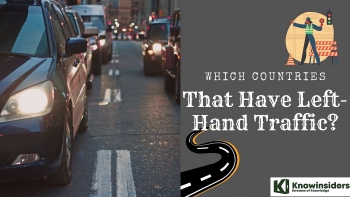 Which Countries That Have Left-Hand Traffic: Top 10 and Full List Which Countries That Have Left-Hand Traffic: Top 10 and Full List Most of the countries drive on the right side of the road, but some of them still drive on the left side. Which Countries That ... |
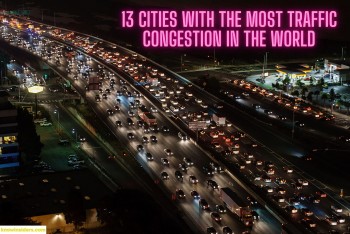 Top 10+ Cities With The Most Traffic Congestion In The World Top 10+ Cities With The Most Traffic Congestion In The World Which city is deserving of the title of world's most congested city? Do you have Bangkok, Dubai, or Moscow in mind? Continue reading to learn ... |
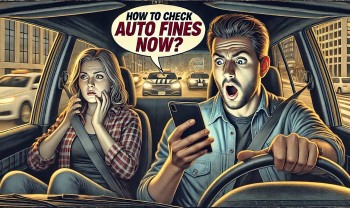 7 Methods for Checking Auto Tickets and Fines in the U.S. 2024/2025 7 Methods for Checking Auto Tickets and Fines in the U.S. 2024/2025 This article will explore the latest methods for checking auto fines, including some of the best online platforms, mobile applications, state-specific regulations, and the latest ... |























